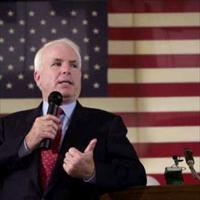Candidate’s Future Policy Must be Closely Scrutinised

At times it feels like the United States is very far away. But of course the reality is that what goes on there politically will have ramifications for the whole world. We are gaining great insight into the race for the party nominations ahead of November’s presidential election from The Point’s man on the ground Alhagie Mbye and it is important that we all take careful note of the reports he sends back.
America is the world’s sole remaining superpower and the approach of its President to foreign policy issues has implications for the entire world.
With this in mind let us examine the attitudes of those still in the race to gain their party’s nomination as candidate.
John McCain is the Republican front runner at the moment and has been very clear and direct with regard to his position on Iraq. He has supported George W. Bush policies on Iraq, including the surge of troops in 2007. He says there are not enough troops on the ground to achieve the long-term successes of clearing insurgency strongholds, training Iraqi forces and rebuilding. This support for the continued occupation of Iraq is common to the other main contenders for the Republican nomination.
Mitt Romney opposes troop withdrawal. He also supported the President’s plan for additional troops in Iraq. Mike Huckabee has said on the issue, “Setting a timetable for withdrawal is a mistake that would result in strategic and humanitarian consequences.” He also opposes proposals to cut funding to the war. He calls Iraq a battle in the “generational, ideological war on terror.”
This shows very clearly that if a Republican candidate succeeds in their bid to get to the White House we will see at least a continuation of US foreign policy in Iraq.
On the Democratic side the views of the two front runners for the nomination are quite different.
Hillary Clinton voted for the use of military force in Iraq, but after learning about the lack of Iraqi weapons of mass destruction she said she would have voted differently. She opposed the Bush plan to increase the number of U.S. troops in Iraq but has conceded that in some places the troop surge is working. She continues to say the occupation should be ended.
Her main rival for the Democratic candidacy Barack Obama opposed the use of military force in Iraq. He voted for a war spending bill that would have withdrawn most U.S. troops by March 2008. He supports the phased redeployment of U.S. troops and opposed George Bush’s plan to send additional troops to Iraq.
It is clear from these positions that the United States position in the world would be quite different under a Democratic President. If the troops were withdrawn from Iraq the act could be used as a launching pad to rebuild trust in American power around the world. The withdrawal would almost certainly be seen as a very positive step in the Middle East and might help rebuild the States tattered reputation there.
Of course a very serious concern to many all over the world is the American position on Iran. Tensions are running high and it’s hoped that a non-military solution to the standoff might be found. The hawks who currently occupy the White House have been very aggressive in their position. Almost, it seems, to the point of making the crisis very much worse.
John McCain believes a nuclear-armed Iran is an “unacceptable risk” to regional and global stability. Mitt Romney supports tighter sanctions, the isolation of Iran diplomatically and would do everything to stop Iran getting nuclear arms. He is keeping the military option on the table. Mike Huckabee says he supports diplomacy with Iran, while keeping military options open. He tempered this however by writing in a Foreign Affairs essay that Osama Bin Laden would welcome a war between the United States and Iran.
On the Democrat side Hillary Clinton has said she will negotiate with Iran but stops short of saying she would negotiate with President Mahmoud Ahmadinejad personally. She voted for a measure urging Iran’s Islamic Revolutionary Guard Corps be labeled a terrorist organization. She says Iran must not be allowed to acquire nuclear weapons and that all options must remain on the president’s table. Barack Obama supports direct presidential diplomacy with Iran without preconditions using a carrot and stick approach. If Iran abandons its nuclear program and support for terrorism the U.S. will offer incentives like economic investments, and a move toward normal diplomatic relations. If Iran does not change; the U.S. will step up economic pressure and political isolation. He does not rule out military action.
So while there are radically different approaches to the issue of Iraq the potential for continued global aggression seems only marginally less likely if there is a Democrat in the White House. With this in mind we shall watch with interest as the race unfolds and hope that a moderate candidate with the interests of international peace is elected by the American people to be their next leader.
 Back and Next - Back and Next
Back and Next - Back and Next See Also - See Also
See Also - See Also